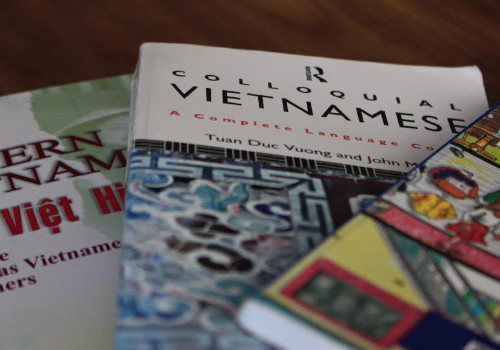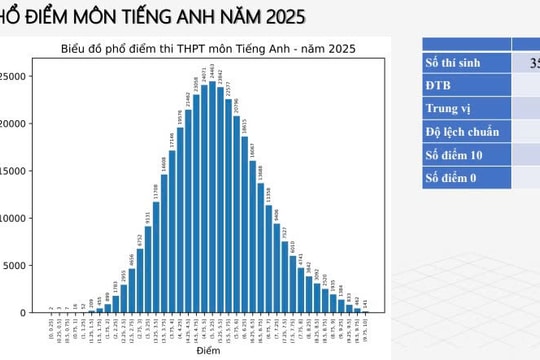Laughing till tears at the story of teaching Vietnamese to Westerners
Even though she taught it many times, Mai Thi's American student in Hanoi still could not distinguish between the two phrases 'Mother and sister' and 'Chi's mother's child'.
Before accepting to teach Vietnamese to her Korean friend, Mai Thi heard her friend say: "It's very difficult, not easy." At first, the second-year student at Hanoi University thought it was simply exchanging funny stories about life so she would learn very quickly. However, when she started working, Mai Thi realized that "the storms are not as bad as Vietnamese grammar."
She confided that there are countless pronouns in Vietnam. In English, there is only "I, you". In Vietnamese, there are "ba", "dad", "ma", "ba", "dad", "ma", "ba", "anh", "chi", "em", "co", "chu", "bac", "duong". With great effort, students can only remember a few pronouns, but the next day they forget and make mistakes.
 |
Vietnamese language teaching books for foreigners. |
"After explaining in English for a long time, I still couldn't understand, so I switched to gesturing to indicate that the two sentences: 'Her mother and daughter' and 'Her mother and daughter' have very different meanings. One sentence is simple, the other has a bad meaning. After listening, the student nodded repeatedly in agreement, but a few minutes later, when asked again, he was still confused because he didn't remember how to address her," Mai Chi said.
Sharing the same situation as Mai Chi, Tien Dat, a student at the University of Social Sciences and Humanities, said that before becoming a Vietnamese tutor for an American, he was also excited and determined. Even on his days off, Dat stayed home to carefully prepare documents because he saw his student was eager to study. Unfortunately, Dat's foreign friend had no talent for foreign languages, and studying for a long time was still useless.
"After teaching a few lessons, I was fed up because it felt like eating raw potatoes. I couldn't say half a sentence, and I had to correct my pronunciation for a long time to get a few words out, and the next day it was the same again. I didn't understand where he read it, so I kept asking: 'What is Chái loaa?'. I heard it 10 times, but I still didn't understand." Later, the student used body language and English to explain: "A dish of minced meat, put in a tube, often eaten during Tet." Only then did Dat realize that "chái loaa" was "giò lụa."
Unable to teach effectively, Tien Dat abandoned all his teaching materials and instead invited his cousin to Ta Hien to drink beer and teach him the most familiar words: "I can't understand the pronoun and tone, but he pronounces the word 'delicious beer' so well," Dat said with a smile.
Although tutoring Westerners is not simple, it brings joy, knowledge, and especially the ability to improve foreign languages to many young people.
Also passionate about his second job like Tien Dat, Quang Dung, a student at Ho Chi Minh City University of Technology, said he also came up with a unique trick to help foreign students understand the meaning of Vietnamese. Accordingly,with someone, for the first time, Dung alsoteach pronunciationboard29 Vietnamese letters.
Dung said that students, especially those from the US and Mexico, are completelycould not distinguish the letters A, Ă and Â. Dung showed how to raise the tone of voice but no one could do it. After instructing, he asked: "Can you distinguish?", the students still shook their heads. Then Dung asked a trick question: "If you get pinched, how will you scream?", the whole class laughed and replied: "Á Á". The teacher answered: "Á Á".cheered and said: "That's right, that's the Vietnamese letter Ă". The unique way of teaching brought Dung's class lots of hearty laughter.
By seriously teaching Vietnamese to foreigners, Dung also gained a lot of knowledge, especially foreign languages, much better than before. Now, not only can he listen and speak well, he also knows how to express himself beautifully from Vietnamese to English.
According to VNE





.jpeg)


